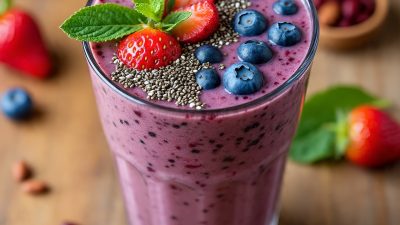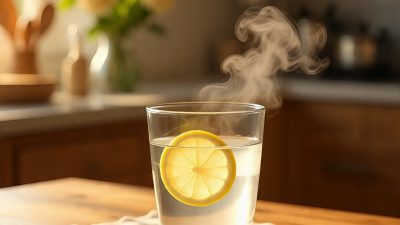Introduction: Why Diet Matters in Fever Recovery
Recovering from a fever isn’t just about getting rest—it’s also about what you put into your body. The foods you eat can significantly affect how fast you recover. Nutrient-rich, hydrating, and immune-boosting foods provide your body the support it needs to regain strength and fight off lingering infection.
Contents
- 1 Understanding Fever Recovery and Nutrition
- 2 Top 10 Natural Foods to Eat When Recovering from a Fever
- 3 1. Broth-Based Soups (Chicken or Vegetable)
- 4 2. Fresh Fruits (Especially Citrus)
- 5 3. Steamed Vegetables
- 6 4. Oatmeal or Congee (Rice Porridge)
- 7 5. Herbal Teas (Ginger, Peppermint, Chamomile)
- 8 6. Yogurt or Kefir
- 9 7. Honey and Lemon
- 10 8. Boiled or Steamed Eggs
- 11 9. Coconut Water or Electrolyte-Rich Drinks
- 12 10. Whole Grains (Brown Rice, Quinoa)
- 13 Foods to Avoid When Recovering from a Fever
- 14 Bonus Tips for a Speedy Recovery
- 15 Sample Daily Meal Plan for Fever Recovery
- 16 Superfoods to Add During Recovery
- 17 When to See a Doctor
- 18 Conclusion: Heal Faster, Naturally
- 19 FAQ
Understanding Fever Recovery and Nutrition
What Happens to Your Body During a Fever?
When you have a fever, your body’s immune system is hard at work fighting an infection. Fever increases your body temperature, speeds up your metabolism, and can cause dehydration, fatigue, and loss of appetite. That’s why it’s so important to nourish yourself with foods that hydrate, replenish nutrients, and support your immune system.
Top 10 Natural Foods to Eat When Recovering from a Fever
In this guide, we’ll explore the best foods to eat when recovering from a fever naturally, so you can bounce back quickly and safely.
Read : Herbal Remedies to Improve Focus and Memory Naturally
1. Broth-Based Soups (Chicken or Vegetable)
Warm, comforting, and easy to digest, broth-based soups are packed with electrolytes and nutrients. Chicken soup, in particular, has anti-inflammatory properties and can help clear mucus and soothe sore throats.
- Why it’s helpful: Hydrates the body, eases digestion, and provides protein and minerals.
- How to enjoy: Add herbs like garlic, ginger, or turmeric for extra healing benefits.
2. Fresh Fruits (Especially Citrus)
Fruits like oranges, grapefruits, strawberries, and kiwi are rich in vitamin C, a key nutrient that boosts immunity.
- Why it’s helpful: Supports white blood cell function and tissue repair.
- Best fruits for fever recovery: Oranges, berries, watermelon (for hydration), and bananas (for potassium).
3. Steamed Vegetables
Vegetables such as spinach, carrots, zucchini, and broccoli are loaded with vitamins A, C, K, and antioxidants.
- Why it’s helpful: Helps reduce inflammation and replenish vitamins lost during illness.
- Pro tip: Steaming makes veggies easier to digest while retaining nutrients.
4. Oatmeal or Congee (Rice Porridge)
Soft, warm grains like oats and rice porridge are gentle on the stomach and provide sustained energy.
- Why it’s helpful: Rich in B vitamins, fiber, and comforting texture for those with low appetite.
- Add-ons: Mix in a bit of honey, cinnamon, or fruit puree.
5. Herbal Teas (Ginger, Peppermint, Chamomile)
Herbal teas soothe sore throats, reduce inflammation, and aid digestion. Ginger tea, in particular, helps fight nausea and chills.
- Why it’s helpful: Hydrating and soothing with natural healing compounds.
- When to drink: Sip throughout the day, especially if your appetite is low.
6. Yogurt or Kefir
Rich in probiotics, yogurt and kefir help rebuild gut health after fever or antibiotics.
- Why it’s helpful: Restores gut flora, improves digestion, and strengthens immunity.
- Choose: Unsweetened, plain yogurt with live cultures.
7. Honey and Lemon
A spoonful of raw honey with a splash of lemon is a natural cough suppressant and sore throat soother.
- Why it’s helpful: Honey has antibacterial properties, and lemon boosts vitamin C.
- Best way to consume: Mix into warm water or tea.
8. Boiled or Steamed Eggs
Eggs are a powerhouse of protein, B vitamins, and healthy fats that support tissue repair and energy production.
- Why it’s helpful: Helps restore muscle strength and supports cellular repair.
- Easy option: Soft-boiled eggs are gentle on the digestive system.
9. Coconut Water or Electrolyte-Rich Drinks
When recovering from fever, hydration is essential. Coconut water naturally replenishes electrolytes lost through sweat.
- Why it’s helpful: Contains potassium, sodium, and magnesium to prevent dehydration.
- Alternative: Make your own natural electrolyte drink with lemon juice, salt, and honey.
10. Whole Grains (Brown Rice, Quinoa)
Complex carbs like quinoa or brown rice provide slow-release energy to support recovery.
- Why it’s helpful: Stabilizes blood sugar and offers fiber, iron, and magnesium.
- Pair with: Steamed veggies or a lean protein for a balanced recovery meal.
Foods to Avoid When Recovering from a Fever
Avoid these to prevent delaying recovery:
- Sugary snacks and sodas – Weaken immunity and spike blood sugar.
- Processed foods – Lack nutrients and may cause inflammation.
- Dairy (if congested) – Can increase mucus production in some people.
- Caffeinated drinks – May contribute to dehydration.
Bonus Tips for a Speedy Recovery
1. Stay Hydrated
Aim for 8–10 glasses of water daily. Add lemon or cucumber slices for flavor and extra vitamins.
2. Eat Small, Frequent Meals
Even if you don’t feel hungry, try eating small meals every few hours to maintain energy levels.
3. Rest is Non-Negotiable
Proper sleep allows your immune system to do its job. Try calming teas before bed to improve sleep quality.
Sample Daily Meal Plan for Fever Recovery
| Time | Meal |
|---|---|
| 8:00 AM | Warm oatmeal with banana and honey |
| 10:00 AM | Ginger tea + orange slices |
| 12:00 PM | Chicken and veggie soup + brown rice |
| 3:00 PM | Coconut water + plain yogurt |
| 6:00 PM | Steamed vegetables + boiled eggs |
| 8:00 PM | Chamomile tea with honey |
Superfoods to Add During Recovery
Want to go one step further? Include these nutrient-dense superfoods:
- Turmeric: Natural anti-inflammatory.
- Garlic: Boosts white blood cells.
- Moringa Powder: Rich in iron, vitamin A & C.
- Bone Broth: Great for joint recovery and gut healing.
When to See a Doctor
While these foods are supportive, always consult your doctor if:
- Your fever lasts more than 3 days.
- You experience vomiting or diarrhea.
- You have pre-existing conditions like diabetes or heart issues.
Conclusion: Heal Faster, Naturally
What you eat plays a major role in how quickly your body bounces back from illness. Choosing the right foods to eat when recovering from a fever naturally helps replenish lost nutrients, restore your strength, and support your immune system. Incorporate these healing foods into your recovery routine—and always listen to your body’s needs. With the right nutrition and plenty of rest, you’ll be back to feeling your best in no time.
FAQ
What foods are best to eat after a fever?
Easily digestible, nutrient-dense foods like broths, oatmeal, bananas, rice, and steamed vegetables are ideal after a fever. These support hydration, digestion, and recovery.
Can I eat fruits while recovering from a fever?
Yes, fruits rich in vitamin C like oranges, papayas, and berries help boost immunity and reduce inflammation during recovery.
Is protein important for fever recovery?
Absolutely. Lean protein sources like chicken, eggs, and legumes help repair tissue and restore energy levels after a fever.
Should I avoid spicy or fried foods after a fever?
Yes, spicy, oily, or fried foods can irritate the digestive system and delay recovery. Stick to bland, soft, and nutrient-rich meals.
How can I stay hydrated after a fever?
Drink plenty of fluids such as water, herbal teas, clear soups, and electrolyte-rich drinks to prevent dehydration and aid the healing process.


